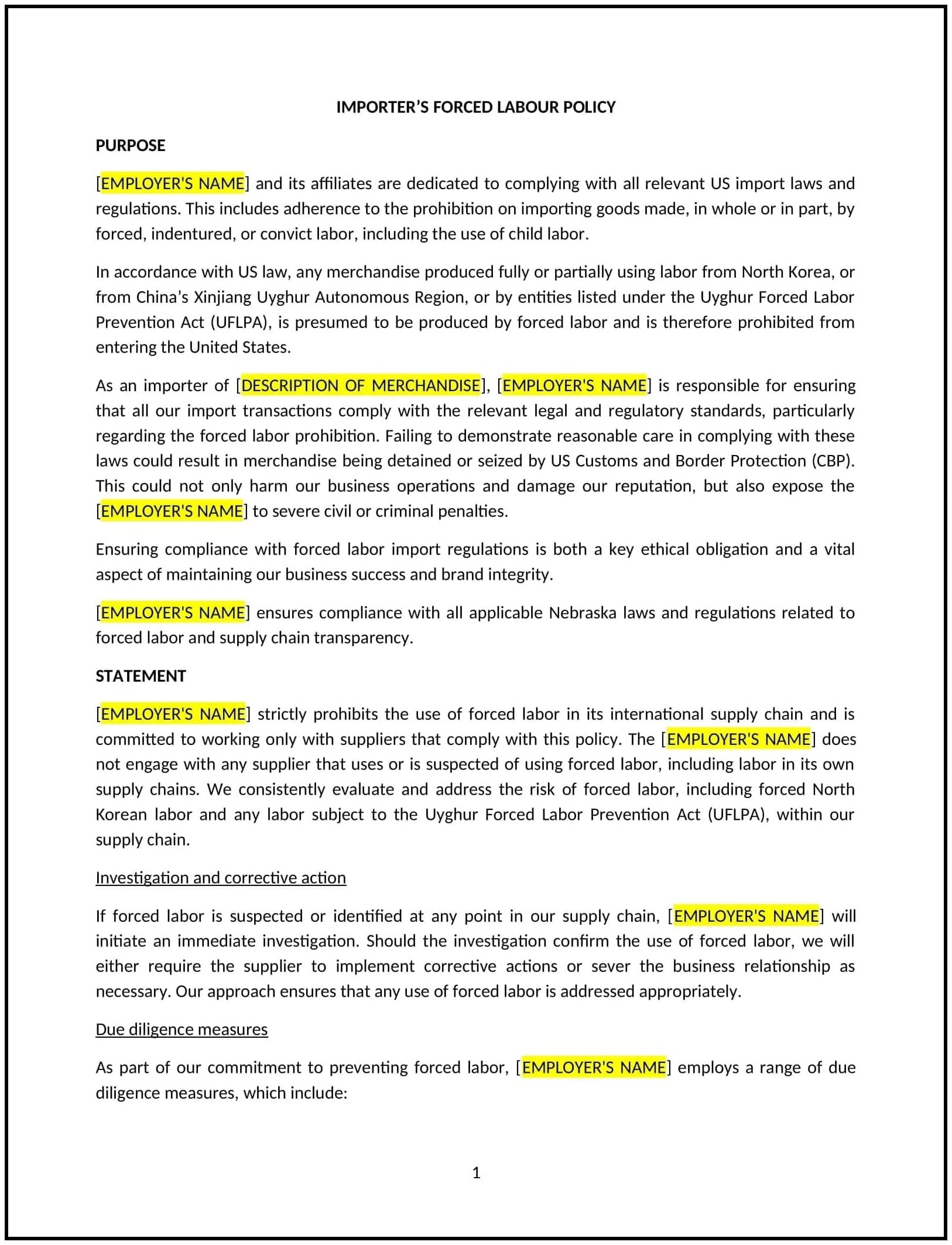Importer's forced labour policy (Nebraska): Free template
Got contracts to review? While you're here for policies, let Cobrief make contract review effortless—start your free review now.

Customize this template for free
Importer's forced labour policy (Nebraska)
An importer's forced labour policy helps Nebraska businesses outline their commitment to avoiding the use of forced labor within their supply chain. This policy sets guidelines for identifying, preventing, and addressing instances of forced labor, ensuring that the company only engages with suppliers and manufacturers who meet ethical standards and comply with anti-slavery regulations. It is designed to protect workers’ rights, uphold ethical sourcing practices, and ensure that the business operates in a socially responsible and transparent manner.
By adopting this policy, businesses in Nebraska can reduce the risk of engaging with suppliers involved in forced labor, protect their reputation, and support compliance with relevant labor laws both in the U.S. and abroad.
How to use this importer's forced labour policy (Nebraska)
- Define forced labor: Clearly define what constitutes forced labor, including human trafficking, bonded labor, or situations where individuals are coerced or deceived into working under threat of punishment or in unsafe conditions. The policy should be in alignment with both U.S. and international anti-slavery laws.
- Identify high-risk areas: Outline the specific industries or regions that may present a higher risk for forced labor, such as certain sectors in developing countries or industries that heavily rely on manual labor. Use this information to guide procurement decisions and supply chain management.
- Set supplier standards: Specify the standards and expectations for suppliers and contractors, including compliance with laws regarding forced labor, human trafficking, and worker rights. Require suppliers to provide documentation that they meet these standards and undergo regular audits or inspections.
- Implement due diligence procedures: Define the process for evaluating and monitoring suppliers to ensure that forced labor is not involved in the production of goods. This may include site visits, third-party audits, and supplier questionnaires. Regularly assess the supply chain to identify potential risks.
- Provide employee training: Offer training to employees involved in procurement and supply chain management on how to recognize indicators of forced labor, conduct supplier audits, and handle concerns related to labor conditions. Ensure employees understand the importance of ethical sourcing.
- Reporting and corrective action: Establish clear procedures for employees, suppliers, and third parties to report suspected forced labor or unethical practices within the supply chain. The policy should also outline the steps the company will take to address these concerns, such as ending business relationships with non-compliant suppliers or working with them to remedy the situation.
- Promote transparency: Require that the company reports its efforts to prevent forced labor to stakeholders, including through public reports or disclosures. This transparency builds trust with customers, investors, and regulatory authorities.
- Review and update: Periodically review and update the policy to reflect changes in laws, regulations, and best practices related to forced labor and supply chain management. Update procurement processes and supplier evaluations as needed.
Benefits of using this importer's forced labour policy (Nebraska)
This policy provides several benefits for Nebraska businesses:
- Protects workers’ rights: By implementing this policy, businesses help safeguard the rights of workers within their supply chain, promoting fair labor practices and improving the working conditions for people in the workforce.
- Reduces legal risks: Businesses that adhere to strict anti-forced labor policies are less likely to face legal challenges, penalties, or reputational damage related to human trafficking or labor law violations.
- Enhances corporate reputation: A strong commitment to eradicating forced labor enhances a business's reputation as a responsible and ethical company, which can increase consumer loyalty and trust.
- Attracts ethical investors: Investors are increasingly interested in companies that adhere to ethical sourcing and labor practices. By committing to a clear forced labor policy, businesses can attract investors who prioritize responsible business practices.
- Improves supply chain transparency: By actively monitoring suppliers and promoting ethical sourcing, businesses gain better visibility into their supply chain, which allows them to address potential issues proactively and manage risk effectively.
Tips for using this importer's forced labour policy (Nebraska)
- Communicate the policy clearly: Ensure that the policy is communicated to all relevant stakeholders, including employees, suppliers, and business partners. Make it available in employee handbooks, supplier contracts, and on the company website.
- Regularly assess suppliers: Perform regular audits of suppliers to ensure they adhere to the forced labor policy and meet ethical labor standards. Consider engaging third-party auditors for unbiased evaluations.
- Offer training and resources: Provide training to employees involved in sourcing, procurement, and supply chain management, and equip them with the tools and knowledge to identify and address issues of forced labor within the supply chain.
- Foster supplier collaboration: Work with suppliers to ensure that they meet the company’s standards and provide them with the support necessary to improve labor conditions if needed. Offer solutions and remediation plans instead of simply severing ties with non-compliant suppliers.
- Stay up-to-date on regulations: Regularly review and stay informed about changes in forced labor and human trafficking laws, both in the U.S. and internationally, to ensure that the policy remains current and effective.